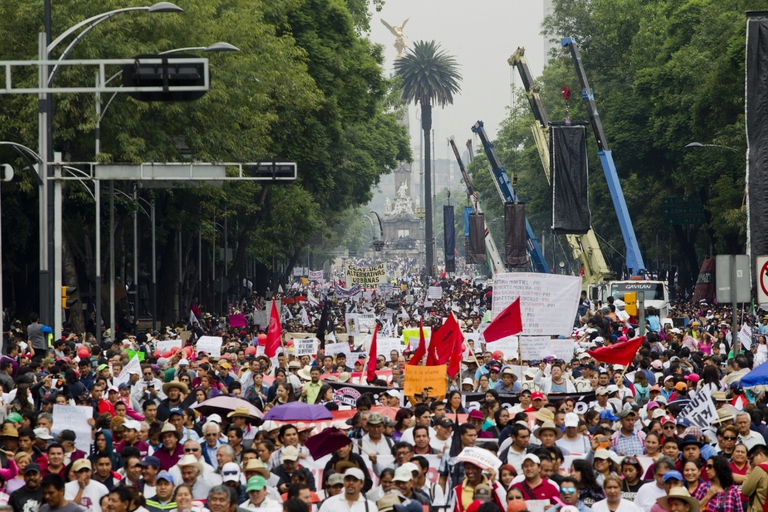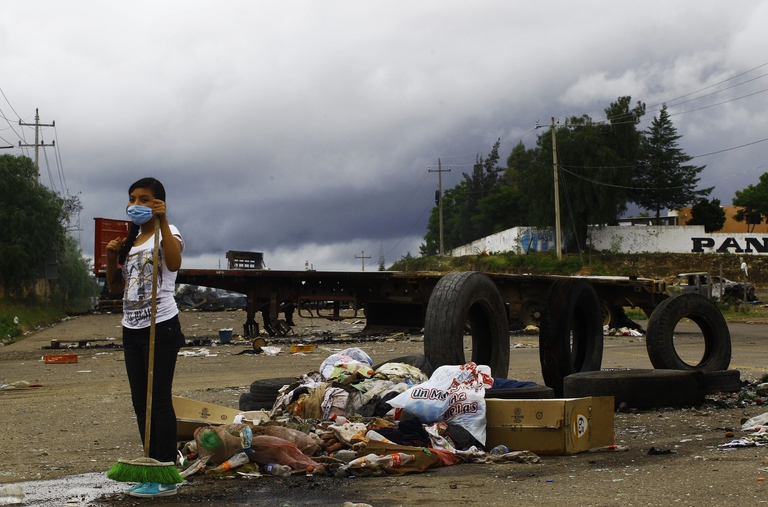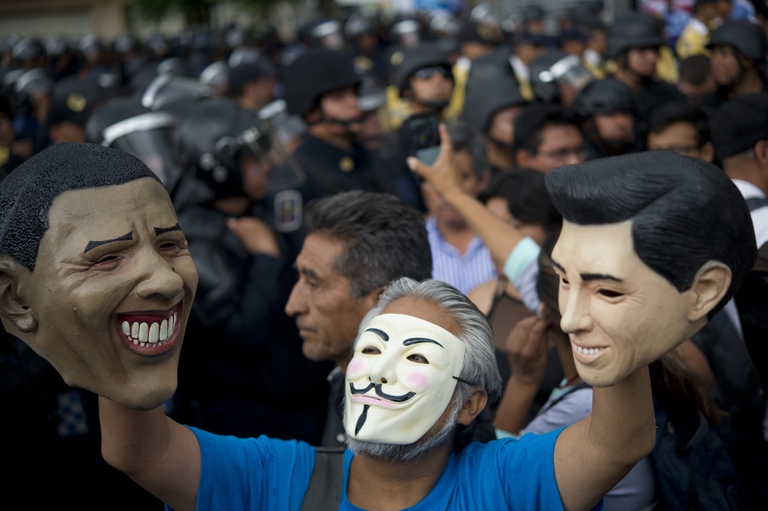
Costa Rica celebrated its first same-sex marriage when two women, Alexandra Quiros and Dunia Araya, celebrated their wedding: an “extraordinary moment”.
Mexico is struggling with a profound human rights crisis. Unionised teachers have radicalised in response to a reform of the education sector whose main pillar is the adoption of a mechanism that will evaluate teaching capacities through standardised testing instead of investing in teacher training or school facilities. Federal and state police contained a teachers’ protest on the
Mexico is struggling with a profound human rights crisis. Unionised teachers have radicalised in response to a reform of the education sector whose main pillar is the adoption of a mechanism that will evaluate teaching capacities through standardised testing instead of investing in teacher training or school facilities. Federal and state police contained a teachers’ protest on the 19th of June in the municipality of Nochixtlán, in the southern state of Oaxaca. They responded to roadblocks and the march with gunfire, leaving eight marchers dead, as well as 53 civilians and 55 police agents wounded. Two people remain missing.
The National Coordinator of Education Workers (CNTE), the teacher’s union, popular in poorer southern states, has organised marches in most major cities opposing the reform and the police’s use of force. The conflict has mobilised the streets of marginalised states like Oaxaca, Chiapas, Guerrero and Michoacán, but what’s even more concerning, warns José Gil Olmos from left-wing newspaper El Proceso, is a widespread discontent visible in prosperous central and northern states.
The government, however, is reluctant to retrace its steps. “The Government is not willing to negotiate the law. Not this particular law … any other law as well is not subject to negotiation,” were President Peña Nieto’s firm words in the aftermath of the Nochixtlán incident. In July, the government initiated negotiations with SENTE, a mainstream teacher’s union with close ties to the governing Institutional Revolutionary Party (PRI). Nevertheless, the CNTE refuses to enter into negotiations until all 75 of its members who have been imprisoned are released.
There are two immediate causes of the ongoing conflict. The education reform, presented by the president in 2013 and the recent arrest of CNTE leaders accused of corruption and money laundering. Supporters of the CNTE argue that the leaders were arrested to undermine the union’s credibility. They also disagree with the reform, as they believe teacher assessment should be a bottom-up initiative, and not take place through a standardised test that doesn’t address the specific needs of rural areas and multicultural context of Mexican society, which is home to 12 million indigenous people who speak 62 different languages between them.
On the other hand, some believe teachers are resisting because the reform will eliminate hereditary posts. “Some union leaders don’t want to lose their privilege to keep selling or inheriting posts, or controlling teachers’ lives in order to have political or economic benefits,” said Public Education Secretary Aurelio Nuño Mayer.
Regardless of controversies around its content, most teachers agree on one thing: the president shouldn’t have adopted the reform unilaterally. There was no prior public debate around the reform, in the view of Juan Luis Hernández Avendaño, director of the Faculty of Social Sciences at Ibero Puebla University, in the Mexican city of Puebla.
A deeper problem, low human rights standards in Mexico, has even wider social repercussions. Various human rights institutions have expressed their concerns over the excessive use of force by police (the Nochixtlán case isn’t an isolated one). “Protective measures remain insufficient and ineffective; impunity and the lack of accountability for violations of the right to life remain a serious challenge, as does the absence of reparations for the victims,” concludes Christof Heyns in the UN Special Report. The methods undertaken by the marchers have received criticisms too. For example, the National Commission for Human Rights put the CNTE under scrutiny after its affiliates in Comitán, in the state of Chiapas, humiliated nine education workers for not participating in a strike by shaving their hair off.
The events in Oaxaca have shown once again that Mexico’s human rights crisis won’t be resolved without substantial commitment from all parts. The government needs to effectively protect human rights, the same way as the CNTE needs to adhere to non-violent forms of protest. Only then will there be a space for the dialogue.
Siamo anche su WhatsApp. Segui il canale ufficiale LifeGate per restare aggiornata, aggiornato sulle ultime notizie e sulle nostre attività.
![]()
Quest'opera è distribuita con Licenza Creative Commons Attribuzione - Non commerciale - Non opere derivate 4.0 Internazionale.
Costa Rica celebrated its first same-sex marriage when two women, Alexandra Quiros and Dunia Araya, celebrated their wedding: an “extraordinary moment”.
On top of a 2.4 million dollar compensation, the indigenous Ashaninka people will receive an official apology from the companies who deforested their lands in the 1980s.
From Italy to the United States, workers in the logistics and delivery sectors are protesting to demand better sanitary conditions to protect themselves from Covid-19.
The pandemic and its restrictions are affecting everyone, without exceptions. However factors like housing, income inequalities, gender, access to technology and working conditions are influencing how people experience the health crisis.
In the midst of India’s coronavirus lockdown, two dozen people lost their lives in a desperate bid to return home: migrant labourers forced to leave the cities where they worked once starvation began knocking at their doors.
Apple, Dell, Microsoft and Tesla are among the tech companies named in a lawsuit brought in the US by the families of children killed and maimed in cobalt mining activities in the Democratic Republic of Congo.
We, the people is Survival’s 2020 calendar, which features the winners of the photography contest showcasing images of the world’s indigenous peoples.
Un violador en tu camino – the rapist is you – is an anthem protesting the impunity of gender-based violence. It began in Chile and has become a global flash mob, bringing people to the streets and resonating all over the world.
Abiy Ahmed was awarded the Nobel Peace Prize for reaching peace with Eritrea. Yet, Indigenous groups in Ethiopia’s Lower Omo Valley have been abused by security forces, a fact that the prime minister must address, says the Oakland Institute.










